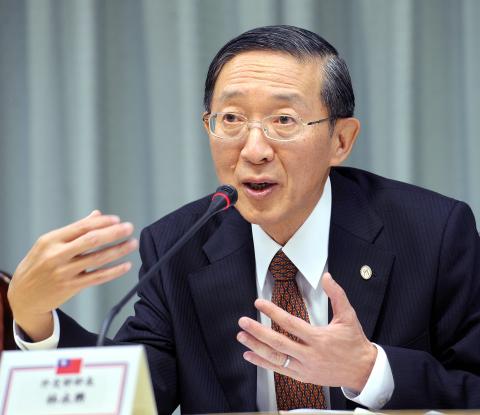|
China not consulted
on visa deal: US
VISA WAIVER: The key development comes in the
lead-up to the US presidential elections, but US authorities say the program is
not a ‘message’ to any other nation
By William Lowther and Shih Hsiu-chuan / Staff reporters in
WASHINGTON and TAIPEI

Minister of Foreign Affairs David
Lin yesterday holds a press conference following the official US announcement to
include Taiwan in its visa waiver program.
Photo: Fang Pin-chao, Taipei Times
China was not consulted over the US’
decision to include Taiwan in the Visa Waiver Program (Visa Waiver Program ) on
Tuesday, both the White House and the US Department of State have said.
“It did not from our perspective require any kind of special communication or
interaction with Beijing,” a senior State Department official said.
A White House source said that while China knew in advance that the Visa Waiver
Program announcement was to be made on Tuesday in Washington, the issue was
never discussed with Beijing.
White House spokesman Jay Carney stressed — in a clear reference to China — that
including Taiwan in the program was not meant to send a “message” to any other
country.
“It’s a logical development in the close security, economic and people-to-people
relationship between the US and Taiwan,” he said.
“The Visa Waiver Program decision is consistent with our commitment to have
robust unofficial relations with Taiwan,” the US State Department official said.
“So no, we did not engage with the Chinese government,” he said.
The Visa Waiver Program announcement — leaked on Monday — was officially
announced on Tuesday in Washington at a US State Department conference on travel
and tourism.
US Secretary of Homeland Security Janet Napolitano said: “Today’s announcement
is a major step forward in our long-standing economic partnership with Taiwan.
Taiwan’s participation in the Visa Waiver Program will not only stimulate
tourism in the US, it will also enable us to work together to maintain the
strictest security standards.”
In accordance with the Visa Waiver Program designation process, she said, the US
Department of Homeland Security determined that Taiwan complies with key
security and information-sharing requirements, such as enhanced law enforcement
and security-related data sharing with the US; timely reporting of lost and
stolen passports and the maintenance of high counterterrorism, law enforcement,
border control, aviation and document security standards, she added.
Taiwan is joining 36 participants in the Visa Waiver Program, which permits
visa-free travel to the US for eligible travelers visiting the US for 90 days or
less for business or tourism.
“The number of tourists bound for the US is growing all the time,” US Secretary
of State Hillary Rodham Clinton said.
“In addition to trying to ease the way for Americans to travel, we have matched
that commitment with trying to ease the way for foreigners to travel here,” she
said.
US media said the decision was announced at the height of the US presidential
election campaign and could be connected to US President Barack Obama’s
political agenda to show that he can be tough on China.
“Taiwan’s inclusion in the Visa Waiver Program is long overdue,” House Foreign
Affairs Committee Representative Howard Berman said.
“It is an appropriate designation and apt status for a country with whom we
share such strong economic and cultural ties,” he said.
Berman concluded: “The free flow of Taiwanese visitors to our country will
deepen the bond between the US and our democratic ally Taiwan.”
In Taipei, Minister of Foreign Affairs David Lin (林永樂) attributed the result to
President Ma Ying-jeou’s (馬英九) “viable diplomacy,” saying the inclusion of
Taiwan in the Visa Waiver Program will “bring great benefits” to US-Taiwan
relations.
Lin said the ministry welcomed the US’ decision, adding that it signifies
significant progress in elevating the nation’s image, enhancing Taiwan-US
relations and contributing to the nation’s external relations handlings.
The progress will enable both countries to further enhance exchanges in trade
and tourism, as well as culture and education areas, Lin said.
After having secured visa-waiver status, one of the most important tasks for
Taiwan in advancing US-Taiwan relationships would be the resumption of
negotiations under the Trade and Investment Framework Agreement platform, Lin
said.
Bruce Linghu (令狐榮達), director-general of the ministry’s Department of North
American Affairs, said the ministry will continue to seek visits to Taiwan by US
Cabinet-level officials to consolidate cooperation in military and security
areas.
|
![]()
![]()
![]()